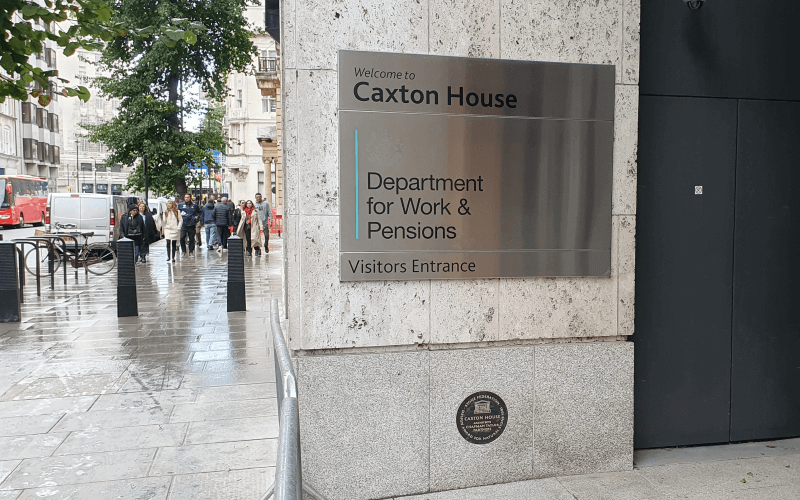The Department for Work and Pensions (DWP) has denied destroying documents that would have revealed why it weakened guidance on when to investigate the cases of benefit claimants who took their own lives, following a probe by the information commissioner.
Repeated searches by DWP civil servants – in response to a request by the Information Commissioner’s Office – failed to unearth a single document relating to the decision.
DWP says it is now impossible to explain “how the decision to change the criteria was made”.
Disability News Service (DNS) has been trying since March to obtain internal DWP documents that would show why the rules on when to carry out internal process reviews (IPRs) were altered in April 2021.
In 2020, DWP told the National Audit Office that it would always carry out one of its secret reviews when it heard of a claimant’s suicide, even if there were no allegations that DWP’s actions had contributed to that death.
But since April 2021, after weakening the rules, DWP now only carries out an IPR following the suicide of a claimant if there is already an allegation that DWP’s actions “may have negatively contributed to the customer’s circumstances”.
That decision meant far fewer internal process reviews were carried out.
In 2022-23, there were 89 referrals from within DWP for an IPR, but only 60 met the new criteria, while in 2023-24, there were 75 referrals and only 53 met the criteria.
DNS had asked DWP, through a freedom of information request, for any documents relating to the decision to weaken the criteria that were held by the team that made the change.
After the department claimed it held no such documents, DNS complained to the information commissioner.
In its response to the commissioner, DWP said it had searched its IT systems, with “file by file checks” of “each of the folders where it would be likely that recorded information would be held”, as well as “full site meta-data searches”.
A second “independent” check was carried out by “an experienced IPR team member”.
None of these checks produced a single document about the decision to weaken the criteria.
The information commissioner, John Edwards, told DNS this week: “DWP confirmed that it was not aware of any specific information that had been destroyed or deleted that related to the request.
“DWP explained that this was confirmed in conversations with colleagues responsible for the IPR team during the period covered by the request.”
When the commissioner raised concerns from DNS that this information should have been “recorded and retained”, DWP told him: “In an operational context, many decisions are made daily, often without them being officially recorded in specific documents.”
It added: “It is also worth noting the events occurring at the time in question, the department was still concentrating on supporting citizens during the pandemic and that may have impacted the decision-making process.”
DWP said it had been unable to confirm if information relating to the decision to weaken the IPR was ever created.
But it added that “if it was created during the period in question, we can confirm that it was no longer held when the original request was received”.
It also told the commissioner that “due to a lack of documentation, turnover of staff and the time that has passed since the period in question”, it could not explain “how the decision to change the criteria was made”.
Edwards ruled this week that, on the balance of probabilities, DWP does not possess the documents DNS was seeking.
He said he “understands why the complainant would believe that information was held” but “cannot determine whether information should be held, only whether on the balance of probabilities, it was held at the time of the request”.
DWP has a long history of hiding and delaying the release of embarrassing information about the deaths of claimants, and destroying incriminating documents.
The Department: How a Violent Government Bureaucracy Killed Hundreds and Hid the Evidence, John Pring’s book on the deaths linked to DWP and the years of cover-ups by the department, is published by Pluto Press
A note from the editor:
Please consider making a voluntary financial contribution to support the work of DNS and allow it to continue producing independent, carefully-researched news stories that focus on the lives and rights of disabled people and their user-led organisations.
Please do not contribute if you cannot afford to do so, and please note that DNS is not a charity. It is run and owned by disabled journalist John Pring and has been from its launch in April 2009.
Thank you for anything you can do to support the work of DNS…

 Young disabled people will ‘earn or learn’ or lose their benefits, Kendall’s unpublished comments suggest
Young disabled people will ‘earn or learn’ or lose their benefits, Kendall’s unpublished comments suggest Mirror backs columnist who claimed ‘millions’ of disabled people were wrongly claiming benefits
Mirror backs columnist who claimed ‘millions’ of disabled people were wrongly claiming benefits Channel 4 documentary on benefits was ‘atrocity’ and ‘insult’ to disabled people in poverty, say activists
Channel 4 documentary on benefits was ‘atrocity’ and ‘insult’ to disabled people in poverty, say activists